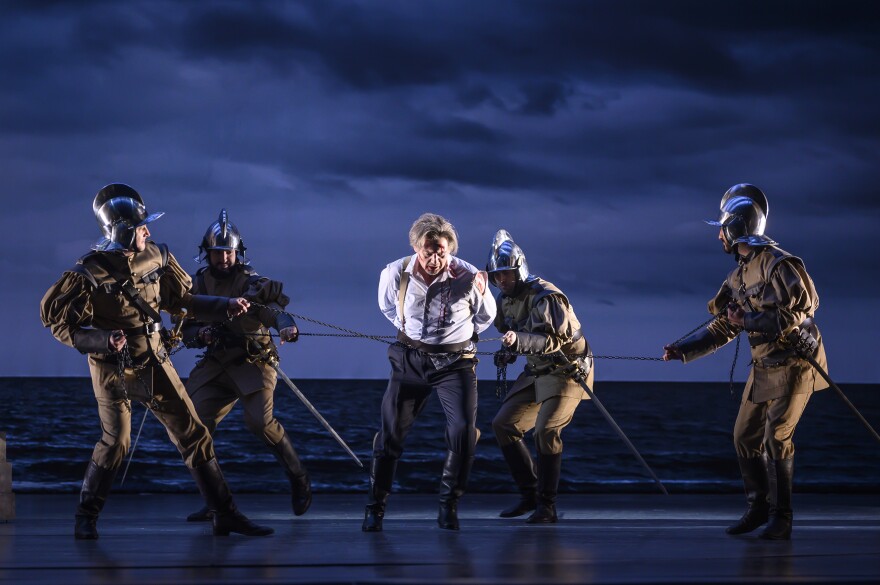Opera Philadelphia opens its season once again with Festival O23, running from September 21 to October 1 (which you may notice is 11 days, but they have one day off). This “opera binge” is the latest in their series celebrating new opera and new ways and places to experience it.
There will, of course, be old opera as well — they’ll have a Verdi piece they’ve not performed in 30 years, and one production is framed by two Baroque composers. But the headlining new work is a piece by a local composer aurally painted by electronics, and tells a story that, though over a century old, reflects elements of life today.
10 Days in a Madhouse
Nellie Bly was, among other interesting vocations, a journalist, and her most famous project was going undercover as an inmate at a New York insane asylum in 1887. She met many different women there, many of whom were not insane but had “conditions” that deemed them so, such as speaking a language other than English, missing their children, or just being poor or not white. Bly’s exposé, published first in the New York World and then as a book titled Ten Days in a Mad-House, struck a chord with composer Rene Orth and librettist Hannah Moscovitch, who adapted it for their opera of the same name. This Opera Philadelphia production will be its world premiere, starring Kiera Duffy as Bly alongside Raehann Bryce-Davis as Lizzie, a character created by Moscovitch. Will Liverman portrays the antagonist, Dr. Josiah Blackwell.
For Orth and Moscovitch, the experience Bly chronicled has an obvious parallel to women’s experience in everyday life even today. “Calling a woman crazy because you don’t like what she’s saying or you don’t understand her behavior…” muses Moscovitch, “that’s a song we all know.”
Bly checked herself into the Women’s Lunatic Asylum on Blackwell’s Island by playing to those presumptions. “She pretended to be mad by making silly faces and staying up all night, and the male doctor said, ‘Of course you’re mad,’” says Orth. “Most of the people there were actually not mentally ill; they were just an inconvenience or a nuisance to society.”

This distinction is illustrated by Orth’s composition. Before she really got into composing, she was studying sound design — the process of not just creating the music around a scene in visual media, but also placing the voices and sounds of the ambient environment. In the new opera, electronics signify the madness some characters are experiencing. “I tried to be pretty intentional when someone’s faking it,” Orth says. “There’s no confusion… that is the acoustic world.” But as Bly reported, the conditions in the asylum were so abhorrent as to push some inmates toward insanity, and some moments aurally depict that struggle.
Orth and Moscovitch both note the important social justice aspects of the opera, right down to issues with opera as an art form itself. Having only worked with men on opera prior to her collaboration with Orth, Moscovitch notes the inherent and rampant sexism in opera plots. “There’s a lot of rape from a male perspective,” she observes, among other sexist concerns. Working with Orth on 10 Days appealed to her “because it was going to actually address the meta-problems that I was seeing within the medium.”
Bly’s exposition of the abusive conditions at the asylum led to the first real funding for mental health. But women still encounter some of these issues: Moscovitch points out a story documented in the NY Times / Serial podcast The Retrievals, about women at a Yale fertility clinic whose pain was waved off by their doctors while a nurse was stealing fentanyl meant for their treatment.
10 Days in a Madhouse will leave audiences with plenty to think about — and of course, plenty to admire among the vocal cast. Audiences daunted by typical opera lengths will also be pleased by the show’s 90-minute running time. It will make for a fascinating portrayal of this story adapted from and reflective of real life.
'Simon Boccanegra'

The festival’s big name is Giuseppe Verdi’s Simon Boccanegra, which returns to the Academy of Music after a 30-year absence. Two of opera’s biggest stars today, Quinn Kelsey and Ana María Martínez, appear as Boccanegra and his long-lost daughter Amelia, and believe it or not, it’ll be their first time on the Academy stage: their company debuts in 2021 had to be moved outside due to the pandemic. Christian Van Horn is Fiesco, and Richard Trey Smagur makes his company debut as Gabriele Adorno. The composer was very involved in politics, and this opera might be his plainest political statement. Boccanegra is a former corsair thrust into office on a wave of populism. Amid his congress at Genoa’s push for war with Venice, reuniting with his long-lost daughter, whose patrician grandfather is Boccanegra’s old enemy, and a former ally turning against him because Boccanegra denied him his daughter’s hand in marriage, all Simon wants is a unified Italy, which was Verdi’s position during the 19th-century Risorgimento. A unifier with an imperfect past might be familiar to modern audiences as well.
'Unholy Wars'

First performed at the 2022 Spoleto Festival, Unholy Wars is a creation of tenor Karim Sulayman that combines old music — Monteverdi and Handel — with new music by Mary Kouyoumdjian based on a tradition many times older, Middle Eastern folk music. The Middle East has often been portrayed in opera as the enemy; the framing story of Unholy Wars is Claudio Monteverdi’s Il combattimento di Tancredi e Clorinda, a fictionalized Crusades-era story of how a Christian soldier and a Muslim woman fall in love, but the Muslim woman is disguised as a man, and, having just been dealt a death blow by her lover, asks him to baptize her as a Christian with her dying breaths.
Sulayman notes that, while this would be the perspective presented to a 16th-century Italian audience, modern audiences would not be nearly as receptive. Instead of never performing the work, though, Sulayman’s solution is to present the work in a way that the Middle Eastern characters’ perspectives are properly represented, while still presenting and potentially introducing Italian Baroque music to the audience. The same could be said for a production further ahead in the season, with director Aria Umezawa, of Japanese descent, taking on Puccini’s Madama Butterfly.
Other Festival Events
Opera Philadelphia makes good use of the fact that two of the best American schools of voice are right here in town. There will be three Afternoons at AVA (the Academy of Vocal Arts) — the first will feature South African bass-baritone Musa Ngqungwana (‘14), a winner of the Metropolitan Opera’s Laffont Competition (as it is now known), and who has performed multiple times with Opera Philadelphia. The second will feature current students at AVA, and closing the series will be mezzo-soprano Anne Marie Stanley (‘22), a winner of the 2022 Laffont competition as well as AVA’s 2021 Giargiari Bel Canto competition. In the spring, she will sing Kate Pinkerton in OP’s production of Madama Butterfly.
Curtis Voices will also be two afternoon performances in the storied institute’s Field Concert Hall. The first will be soprano Amanda Majeski (‘09), who has received acclaim from all over the world for her performance, and the second will feature current students at Curtis Opera Theatre.
Most evenings of the festival will close with Late Night Snacks, a series of cabaret performances at The Closet hosted by The Bearded Ladies. Guests will include Dynasty Handbag, Le Gateau Chocolat, and An Evening with World Renowned Local Composer Sgt. Jennifer Higdon and Her Lonely Hearts Club Band.


